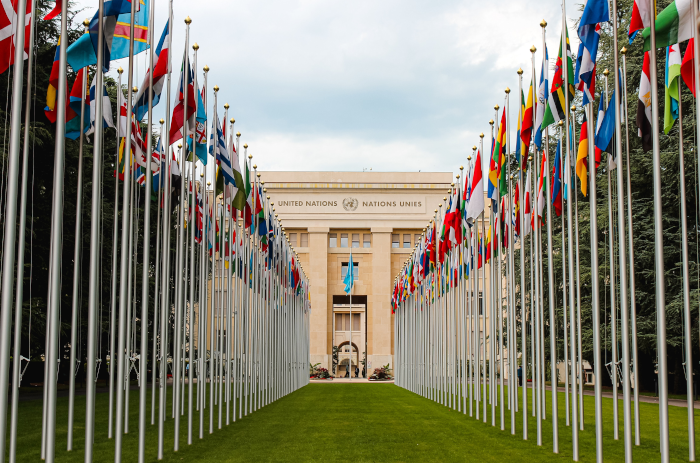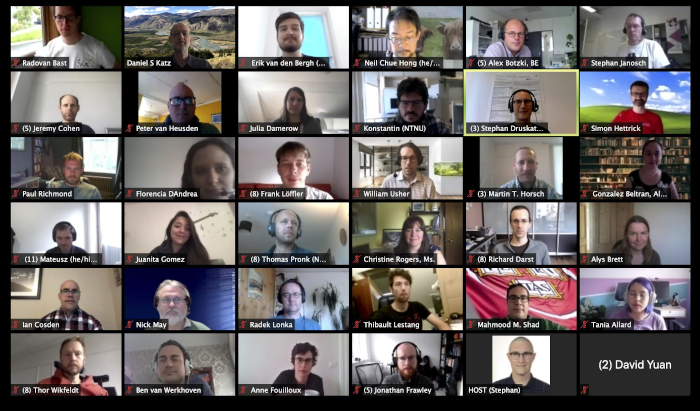Blog
-
International Council Endorsement for RSE Conferences
Photo by Miguel Henriques on Unsplash.
Authors
- Ben van Werkhoven, on behalf of the Council
The International Council of RSE Associations is happy to endorse RSE conferences and similar events. The Council will list and promote endorsed events on its website and other communication channels, and encourage its members to promote these events to their membership. In turn, the event organizers are expected to mention the endorsement on their websites and communication.
Read more
-
International RSE day
Photo by Erwan Hesry on Unsplash.
Authors
- Ben van Werkhoven, on behalf of the Council
The International Council of RSE Associations has decided to declare the second Thursday in October to be “International RSE Day”. The first annual International RSE Day will be Thursday, 14th October 2021.
Read more
-
How RSE Associations work financially
Photo by Micheile Henderson on Unsplash.
Authors
- Daniel S. Katz
- Anne Claire Fouilloux
- Ben van Werkhoven
- Frank Löffler
- Stephan Druskat
This blog post is intended to talk about how different RSE associations financially function (purely volunteer; income from membership, events, sponsors, etc.; costs for events, staff, other).
Read more
-
Introducing the International Council of RSE Associations
Photo by Mat Reding on Unsplash.
Authors
- Daniel S. Katz
- Stephan Druskat
- Ian Cosden
- Paul Richmond
- Anne Fouilloux
A blog post from the 2nd International RSE Leaders Workshop 2020.
The RSE movement has been very successful, leading to thousands of both formally titled and self-described RSEs, about 7 national or multinational RSE associations, and a series of international RSE events (SORSE). This growth has led to a challenge, that there is no formal mechanism to ensure that the national associations collaborate internationally. This means that there is no clear view on who should be running international branded events such as an “International RSE Conference” and no active coordination to ensure that the national associations don't compete for conference dates by accident. In addition to organisational aspects, associations often face similar governance and policy challenges as well as potentially duplicating initiatives that could be run across associations. At the same time there is a need to provide resources and a point of contact for aspiring communities. It is necessary to find a working model for communities with a broad spectrum of maturity levels, giving a forum to the ones further ahead in the process of establishing an initiative, while providing means for others to get started.
Read more
-
How do RSE groups work?
Photo by form on PxHere (CC-0).
Authors
- Will Usher, KTH Royal Institute of Technology, Sweden, [email protected], 0000-0001-9367-1791
- Neil Chue Hong, University of Edinburgh, United Kingdom, [email protected], 0000-0002-8876-7606
- Richard Darst, Aalto University, Finland, [email protected], 0000-0002-0402-7994
- Alejandra Gonzalez-Beltran, Science and Technology Facilities Council, United Kingdom, [email protected], 0000-0003-3499-8262
- Daniel S. Katz, University of Illinois at Urbana-Champaign, United States of America, [email protected], 0000-0001-5934-7525
- Frank Löffler, Friedrich Schiller University Jena, Germany, [email protected], 0000-0001-6643-6323
- Thomas Pronk, University of Amsterdam and University of Nottingham, Netherlands and United Kingdom, [email protected], 0000-0001-9334-7190
- Paul Richmond, University of Sheffield, United Kingdom, [email protected], 0000-0002-4657-5518
- Mahmood Shad, Harvard University, United States of America, [email protected], 0000-0002-1412-1378
- Konstantin Stadler, Norwegian University of Science and Technology, Norway, [email protected], 0000-0002-1548-201X
- Erik van den Bergh, Wageningen University, Netherlands, [email protected],
- Ben van Werkhoven, Netherlands eScience Center, Netherlands, [email protected], 0000-0002-7508-3272
A blog post from the 2nd International RSE Leaders Workshop 2020.
The Challenge: New Roles in Old Institutions
Research Software Engineers (RSEs) are popping up everywhere across the research landscape. They may manage research data, administer High-Performance Computing (HPC) clusters, or develop scientific software, to name a few of their activities. RSEs have the background and skills to deal with the unique challenges that arise from the technical side of science. As demand for their services booms, a single RSE may quickly find themself managing a whole RSE group. However, their roles are rather novel, so it can be difficult to structure such a group or find a place in relatively rigid academic structures. How should a fledgling group leader organize their group? What are the pitfalls of different structures/models?
Read more
-
Working Group: Single Entry Point and Marketplace for the RSE Community & RSE Profile Map
Photo by delfi de la Rua on Unsplash.
Authors: Julia Damerow, Martin Thomas Horsch, Stephan Janosch
At the RSE Leadership Workshop in September 2020, this working group came together to discuss two main objectives. Part of the time, we talked about plans to provide a single entry point to the international RSE community. This discussion was based on previous work by which the website https://researchsoftware.org/ was established. The main goals were to make all relevant information on RSE communities around the world findable and accessible both to insiders and outsiders, and to explore the idea of a digital marketplace. Such a marketplace was envisioned to be a place where people and institutions could find the RSE support that they require and that would let individual RSEs and RSE groups acquire new projects. The other topic, we discussed was the idea of creating an RSE “profile map” that could serve as a tool for RSEs and non-RSEs alike to describe the different tasks and skill sets of an RSE. Since such a profile map would need a home, we considered this being part of the single entry point discussion.
Read more
-
The Research Software Engineer's Toolkit: Information and tools to support the RSE community
Photo by cottonbro from Pexels.
Authors: Jeremy Cohen (Imperial College London), Alex Botzki (VIB), Jonathan Frawley (Durham University), Nick May (RMIT University), David Pérez-Suárez (University College London)
As the profile of Research Software Engineering (RSE) continues to grow, increasing numbers of researchers are discovering RSE. Being able to find technical and domain-specific information is of vital importance in supporting RSEs in growing their knowledge and skills and undertaking their work. However, despite the wealth of technical material and information available, it can often be difficult to know where to find that piece of information that you need to solve a pressing technical issue, or just learn about a new topic or domain.
The Research Software Engineer’s Toolkit is here to help! The toolkit will be an open community resource that is intended to provide “A set of documentation, tools and guidance to support Research Software Engineers in developing reliable, sustainable and robust code”. This wide-ranging remit makes the project challenging but also something that we hope will, ultimately, become a valuable community resource.
The authors of this post came together as a team as part of the 2nd International RSE Leaders Workshop 2020 to look at the initial shell of the RSE Toolkit and decide how it can be taken forward to form an open community resource. This blog post highlights the team’s work.
Read more
-
The 2nd International RSE Leaders Workshop 2020
Pictured: A COVID-19-compatible “group photo” of most of the workshop participants.
Organizers: Stephan Druskat (de-RSE), Radovan Bast (Nordic RSE), Ian A. Cosden (US-RSE), Anne Claire Fouilloux (Nordic RSE), Simon J. Hettrick (Society of Research Software Engineering, UK), Daniel S. Katz (US-RSE), Johan Philips (beRSE), Peter van Heusden (African RSSE), Ben van Werkhoven (NL-RSE), Claire Wyatt (Society of Research Software Engineering, UK)*
In 2018, the first International RSE Leaders Workshop took place in London/UK. Amongst other successes, it saw the foundation of the Nordic RSE community and helped improve access to software expertise in research. Since then, the international RSE community has seen a lot of progress, with new associations being formed, new national and international RSE conferences (RSEConUK 2019, deRSE19, NL-RSE19, Nordic RSE conference, beRSE Research Software Developers Day) being run, and informal international collaboration strongly increasing. These developments led to an internationally run online replacement for the RSE conferences that had to be cancelled due to COVID-19: SORSE - the international Series of Online Research Software Events.
To provide a discussion and knowledge exchange forum for the new generation of RSE associations and foster further collaboration between them, and to help new RSE communities form and establish themselves, we organized and ran the 2nd International RSE Leaders Workshop in September 2020. It was originally planned as an in-person event to take place in Oslo, Norway, but was moved online due to the COVID-19 pandemic.
Read more
-
Tools for managing RSE projects
Managing an RSE team can involve carrying out a broad range of tasks relating to the management of people and projects. The exact nature of these tasks will depend on the size of team, and the how the leadership role is defined within any particular institution, but they typically include scheduling, resource allocation, reporting, communication, task management and record keeping. Our discussion at the RSE Leaders Workshop in January 2018 focused on sharing knowledge about effective tools for managing these processes.
Authors: Mark Woodbridge (Imperial College London), James Meakin (Radboud University Medical Center), Jim Procter (University of Dundee), Jeffrey Salmond (University of Cambridge), Daniel Smith (The Molecular Sciences Software Institute)
Read more -
International RSE Leaders Workshop
By Alys Brett, UK Atomic Energy Authority / UK RSE
In January 2018, leaders of Research Software Engineering groups, networks and initiatives from around the world gathered in London for the first ever International RSE Leaders workshop, organised by UK RSE. The event generated huge enthusiasm and progress towards the goal of improving access to software expertise in research by pooling knowledge, coordinating efforts and establishing collaboration.
Read more
 Research Software Engineers International
Research Software Engineers International